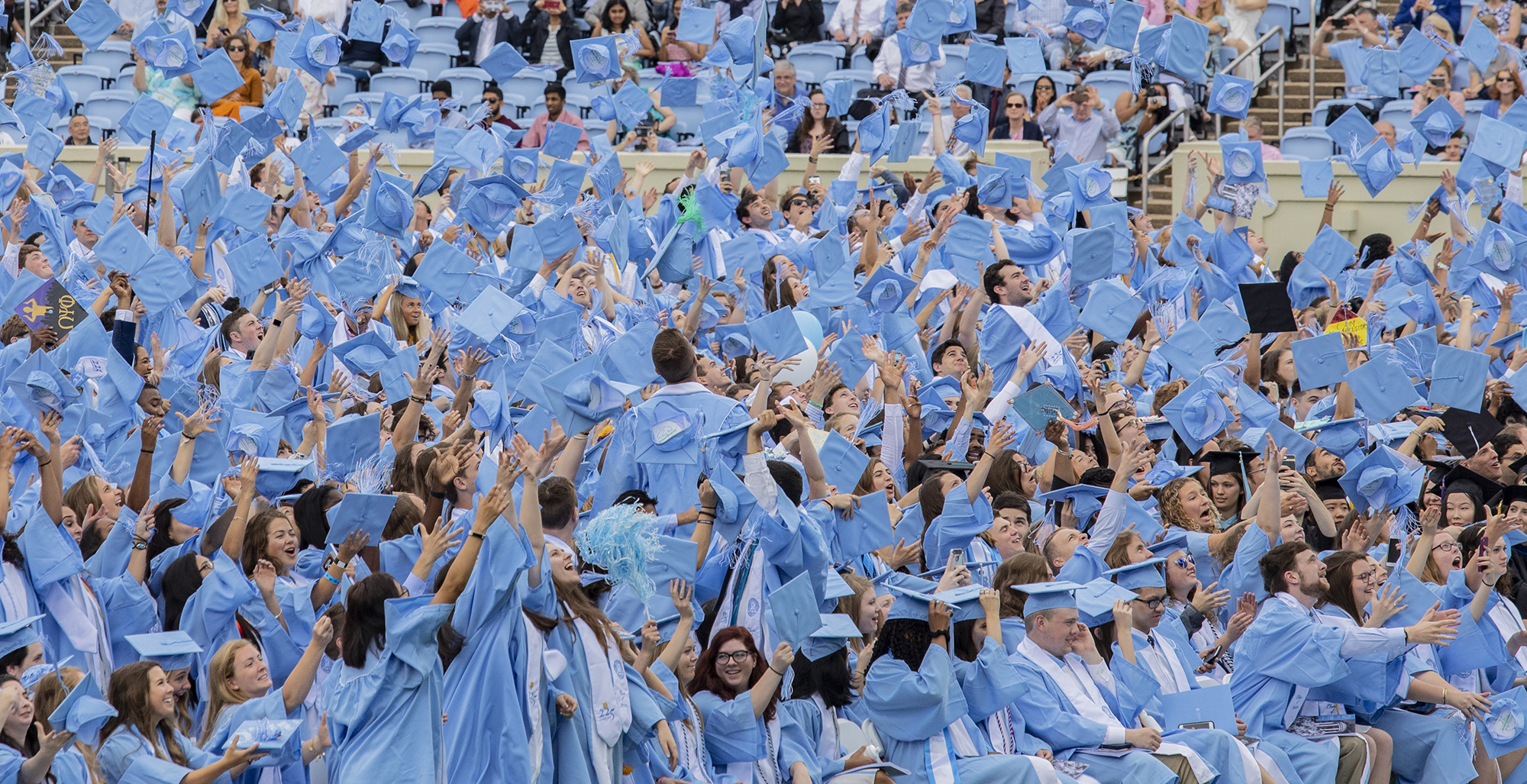Commencement Postponed; Student Aid Fund Available
Posted on March 20, 2020 | Updated April 2, 2020
UNC Chancellor Kevin Guskiewicz, who is the parent of a graduating senior, sent a message to students saying his office would send a survey to ask their opinions about alternative dates and other options. (Johnny Andrews ’97/UNC)
Carolina’s spring Commencement will not be held as scheduled due to the impact of COVID-19. The UNC System Board of Governors on Friday told all chancellors in the system to postpone ceremonies or make alternate plans for graduation ceremonies.
“We’re in the midst of a very serious health crisis,” system President Dr. William Roper said. “It’s going to get worse before it gets better. We believe that spring graduation ceremonies will be disrupted, and it’s time to make alternative plans. I know and understand that this will disappoint our students and their families who have worked so hard toward this goal for so many years.”
UNC Chancellor Kevin Guskiewicz, who is the parent of a graduating senior, sent a message to students about the change, asking them their opinions about alternative dates and other options. A subsequent message presented students with five options: a virtual commencement on May 10, the original scheduled date; a mid-August celebration in Kenan Stadium; a celebration in conjunction with University Day festivities Oct. 11-12; a celebration in conjunction with winter Commencement Dec. 13; and a combination of a virtual ceremony May 10 and a live celebration later.
“We have had to confront the impact of this new reality on our Spring Commencement exercises,” Guskiewicz said. “Today, in accordance with the latest public health guidelines regarding travel and interpersonal contact, I regret to inform you that we are postponing Commencement events, including the doctoral hooding ceremony on May 9 and the ceremony in Kenan Stadium on May 10. School and unit ceremonies will also be postponed.”
Guskiewicz told the UNC trustees March 26 that the early returns leaned toward the August option.
On April 2, Guskiewicz announced that UNC had canceled all programs involving group activity in all University facilities through June 30.
Meanwhile, a fund set up for Carolina students facing financial hardships has raised more than $500,000 from private donors, University funds and a student government emergency fund. Students forced into hardship due to the effects of the COVID-19 outbreak can apply for assistance through the Carolina Student Impact fund.
The fund helps students who are facing unexpected financial challenges, such as the loss of an off-campus job because of layoffs, an unexpected trip home from campus or urgent supplies now that dining halls and residence halls are inaccessible to some students, said Rachelle Feldman, associate provost and director of scholarships and student aid at Carolina. The fund is supported by private donors and was established to help students who are affected by natural disasters.
Students were notified March 30 that they will be able to get refunds on campus housing and prepaid campus dining services, as approved by the Board of Governors. Guskiewicz said refunds will vary depending on each person’s housing and meal plan cost and that the payment schedule still is being worked out.
The University announced on April 2 that all summer school courses will be taught remotely. Undergraduates will be allowed to take nine credit hours instead of the usual six and will have the same option offered in the current semester to take all courses pass/fail.
In making the announcement, Provost Robert Blouin said more than 1,650 undegraduates had been affected by the cancellation of spring and summer study abroad programs.
Dr. David Weber, a UNC professor of medicine, pediatrics and epidemiology and associate chief medical officer of UNC Health Care, told the Board of Governors in March that he believed cases of the virus will peak in four to 12 weeks and that precautions such as social distancing should continue for four to six weeks beyond that.
Weber said he expects public places such as restaurants and sports venues will stay closed for eight to 20 more weeks. Campus dining halls remain open to serve takeout to those students.
Guskiewicz told the trustees that about 900 students who could not return to their homes are living in campus dorms.
The BOG agreed to meet in the next two weeks to confront the coronavirus impact on campuses and determine how to approach the N.C. General Assembly for help with a relief package and to discuss possible refunds to students.
Roper reported that more than 95 percent of classes throughout the system were ready for online instruction scheduled to begin next week. Students are expected to be moved off campuses by Monday.
The student impact fund will provide emergency support for various expenses on items such as housing, food, travel and technology to students who are unable to meet the unexpected financial burdens resulting from the effects of the novel coronavirus.
Already the fund has helped many students who needed to return from studies in places such as China, South Korea and Italy, Feldman said.
Students who need assistance should email covidcareforstudents@unc.edu or ccfs@unc.edu.
